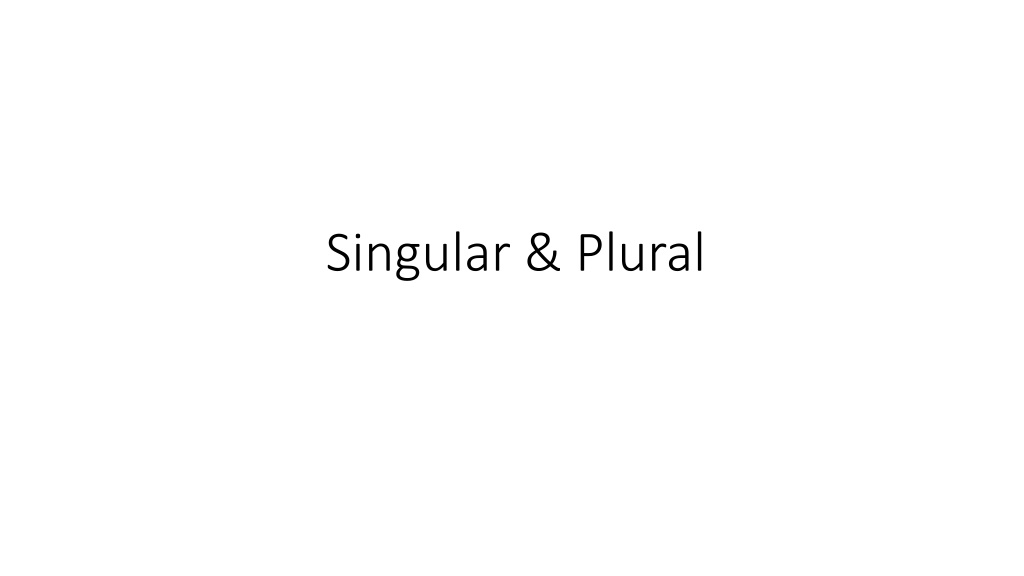
Understanding Singular and Plural Nouns in English
Learn how to differentiate between singular and plural nouns in English grammar with examples and explanations. Discover when to use plural verbs with singular nouns and vice versa. Explore common exceptions and guidelines for using singular and plural forms correctly in sentences.
Uploaded on | 0 Views
Download Presentation

Please find below an Image/Link to download the presentation.
The content on the website is provided AS IS for your information and personal use only. It may not be sold, licensed, or shared on other websites without obtaining consent from the author. If you encounter any issues during the download, it is possible that the publisher has removed the file from their server.
You are allowed to download the files provided on this website for personal or commercial use, subject to the condition that they are used lawfully. All files are the property of their respective owners.
The content on the website is provided AS IS for your information and personal use only. It may not be sold, licensed, or shared on other websites without obtaining consent from the author.
E N D
Presentation Transcript
Singular Singular & & Plural Plural Sometimes we use plural nouns for one thing that has two parts. For example: These words are plural, so they take a plural verb: - My trousers are too long. (not my trousers is)
Singular Singular & & Plural Plural You can also use a pair of + these words: - Those are nice jeans. or That s a nice pair of jeans. (not a nice jeans) - I need some new glasses or I need a new pair of glasses. Some nouns end in ics, but are not usually plural, For example: athletics economics electronics gymnastics mathematics physics politics - Gymnastics is my favorite sport.
Singular Singular & & Plural Plural News is not plural. - What time is the news on television? Some words ending in -s can be singular or plural. For example: means a means of transport many means of transport series species a television series two television series a species of bird 200 species of bird
Singular Singular & & Plural Plural Some singular nouns are often used with a plural verb. For example: audience committee company family farm government staff team These nouns are all groups of people. We often think of them as a number of people (= they), not as thing (= it). So we often use a plural verb: - The government (= they) want to increase taxes. - The staff at the school (= they) are not happy with their new working conditions.
Singular Singular & & Plural Plural In the same way, we often use a plural verb after the name of a sports team or a company: - Italy are playing Brazil next week. - Shell have increased the price of petrol. A singular verb (The government wants / Shell has etc.) is also possible.
Singular Singular & & Plural Plural We do not often use the plural of person ( persons ). We normally use people (a plural word): - He s a nice person. but They are nice people. (not nice persons) - Many people don t have enough to eat. We think of a sum of money, a period of time, a distance etc. as one thing. So, we use a singular verb: - Twenty thousand pounds (= it) was stolen in the robbery. - Three years (= it) is a long time to be without a job. - Six miles is a long way to walk every day.
Singular Singular & & Plural Plural Exercise: Choose the correct form of the verb, singular or plural. In one sentence either the singular or plural verb is possible. - Gymnastics .. my favorite sport. (is/ are). - The trousers you bought for me . ... fit me. (doesn t/ don t). - The police to interview two men about the robbery. (want/ wants). - Physics . my favorite subject at school. (was/ were). - Can I borrow your scissors? Mine .. sharp enough. (isn t/ aren t) - Fortunately the news .. as bad as we expected. (wasn t/ weren t) - Where .. Your family live? (does/ do) - Three days long enough for a good holiday. (isn t/ aren t)
Thank You Thank You
